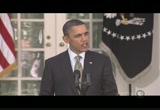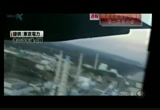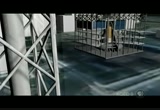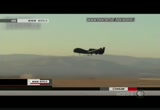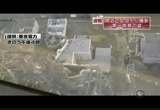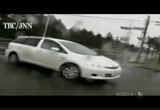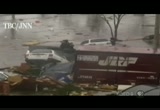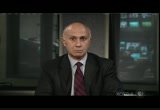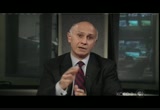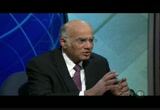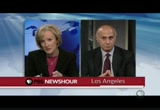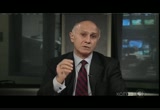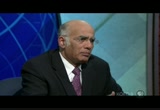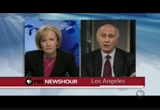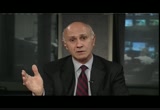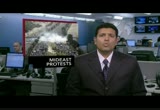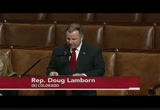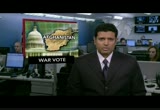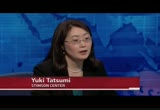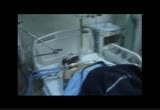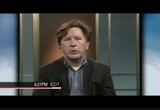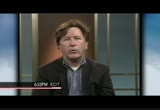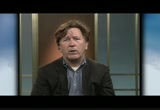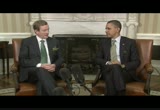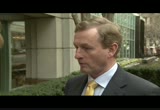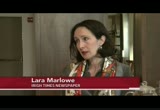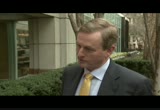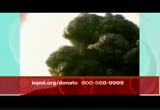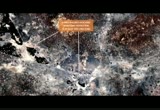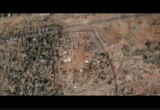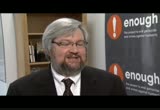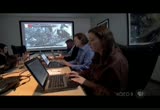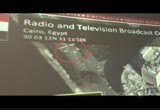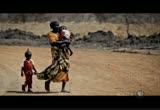tv PBS News Hour PBS March 17, 2011 6:00pm-7:00pm PDT
6:00 pm
captioning sponsored by macneil/lehrer productions >> brown: workers at japan's damaged fukushima nuclear plant used water cannons, heavy duty fire hoses, and military helicopters in an effort to cool down overheating fuel rods, but it's not clear that anything has worked. president obama said today there was no risk to any u.s. territory from the reactors. good evening. i'm judy woodruff. >> brown: and i'm jeffrey brown. on the newshour tonight, we have the latest on the containment operations, the ongoing exodus of people from areas close to the reactors, and new footage from when the tsunami struck six days ago. >> woodruff: and amid signs of both resilience and confusion, we look at japan's political culture in response to the
6:01 pm
disaster. >> brown: then, ray suarez has an update on libya, as the u.n. moves to a vote on establishing a no-fly zone over the country. >> woodruff: margaret warner talks to irish prime minister enda kenny about the celtic tiger's struggle to kick-start it's economy. >> brown: and tom bearden reports on a project to use private satellites to help stop genocide. >> woodruff: that's all ahead on tonight's newshour. major funding for the pbs newshour has been provided by: >> you can't manufacture pride, but pride builds great cars. and you'll find it in the people at toyota, all across america. >> auto companies make huge profits. >> last year, chevron made a lot of money. >> where does it go? >> every penny and more went into bringing energy to the world. >> the economy is tough right
6:02 pm
now, everywhere. >> we pumped $21 million into local economies, into small businesses, communities, equipment, materials. >> that money could make a big difference to a lot of people. >> and by bnsf railway. pacific life. >> and by the bill and melinda gates foundation. dedicated to the idea that all people deserve the chance to live a healthy productive life. and with the ongoing support of these institutions and foundations. and... this program was made possible by the corporation for public broadcasting. and by contributions to your pbs station from viewers like you. thank you.
6:03 pm
>> brown: japanese engineers marshaled all their remaining tools today in the week-long struggle to prevent a full-blown nuclear disaster. and in washington, president obama sought to reassure americans about the potential for radiation to drift over the u.s. >> we do not expect harmful levels of radiation to reach the west coast, hawaii, alaska, or u.s. territories in the the pacific. that is the judgment of our nuclear regulatory commission and many other experts. furthermore, the centers for disease control and prevention and public health experts do not recommend that people in the united states take precautionary measures beyond staying informed. >> brown: the president also made an unannounced visit to the japanese embassy in washington. he signed a condolence book for the thousands of dead and missing. and he said he has ordered a complete safety review of all 104 nuclear reactors in the u.s.
6:04 pm
meanwhile, u.s. officials kept a watchful eye on the situation at the fukushima daichi plant 140 miles north of tokyo, heavily damaged after losing its cooling system in last week's earthquake and tsunami. a spokesman for the plant's owner said today, "we are doing all we can as we pray for the situation to improve." we have a series of reports from independent television news, beginning with tom clarke, on the nuclear crisis. >> reporter: filmed yesterday through a shaky lens, from the safety of a military helicopter, this is the closest glimpse yet of the stricten fukushima nuclear plant. no one is visible outside, given the levels of radiation, few people would want to be. around the wrecked reactors, obvious damage to other buildings caught in the blast. this is the remains of reactor number 3, the core shield
6:05 pm
believed to be cracked. radioactive steam is clearly escaping from within. but it's the situation obscured by the rubble of building number 4 that's now cause for international concern. this thick vapor is thought to be from a pool where 100 tons of nuclear fuel is stored. two nearby are also heating pup the storage pool contains all the nuclear fuel rods recently removed from the reactor. normally, at least five meters of cool water is kept above the rods to prevent them overheating and shield workers from their radioactive. reports suggest that pool is now completely dry. and that's not good. radiation levels around the pool will now be fatally high. no one can enter the area. exposed to the air, the fuel rods will get dangerously hot.
6:06 pm
if engineers can't cover the rods with water soon the worst-case scenario is that they catch fire and burn. that would generate hydrogen with the oxidation reaction, and that may lead to more fires and explosions. and i think that's where the area of focus is now. >> reporter: british chinooks dumped water on the reactors from above. official confusion over the true status of that storage pool. engineers at the plant mained there may still be water but it was too radioactive to check. an american drone flying over today concluded it was now empty and the rods extremely dangerous. this evening, teams of firefighters assembled near the plants to begin trying to pump water in from trucks. if there's one piece of good news, it's that levels of radiation, if they are, indeed, accurate, haven't risen since yesterday. the levels vary depending on distance from the site. a person standing near building number 4 would experience 400,000 microsevets, in one
6:07 pm
newshour, hour other nearly twice the maximum annual dose for emergency crews. outside the plant, levels are 100 times less but still dangerous. some 45 miles away in fukushima city, it drops to 170. and in tokyo, 140 miles away, the level is just .400 of a microsevet for hour, 1/500 of a dose from a chest x-ray. despite reassurances new crises have emerged daily from fukushima. six days since the emergency began, there is as much uncertainty about the danger as there was at the start. >> woodruff: american and japanese officials have given sharply differing assessments of the nuclear situation. and the u.s. and other nations have now ordered chartered flights to get their citizens out of japan. sarah smith reports on the growing exodus of foreigners and japanese.
6:08 pm
>> reporter: a rush hour train in tokyo should be absolutely packed but after the exodus, the city feels deserted. the intercity bullet traps are taking the strain, moving tens of thousands of people to the south where they think it's safe. children are particularly vulnerable to the effects of radiation, so families are especially keen to get out. what finally made you think it was time to leave tokyo? >> ( translated ): in the last two days, the government has looked more and more desperate. we're more worried for the children than ourselves, so we decided to leave. >> reporter: driving through streets this empty feels very strange in a city that's usually so crowded. people here don't believe their own prime minister anymore. "how can he tell them the plant is safe when america jounz a
6:09 pm
growing list of countries to extract its citizens." the prime minister's spokesman said it was unnecessary. >> it's difficult to understand the reason behind that kind of behavior. >> reporter: people are flooding into places trying to escape from a threat they cannot see, one they don't know for sure really exists, but one that is so frightening, they don't dare take the risk. she quickly packed up and moved into a hotel. from a generation who remember the atomic bomb attacks on japan she has a particular fear of radiation. >> ( translated ): so many lives were lost in the suttles,. with the radiation, you suffer forever. radiation is more frightening. >> reporter: long queues for
6:10 pm
petrol stopped people heading south as fast as they'd like but anyone who really believes they are in danger in tokyo will do what it takes to get away. >> brown: more than 450,000 japanese remained in emergency shelters today with supplies running short. and there were new accounts of harrowing escapes from the tsunami. carl dinnen reports on one such story filmed by a japanese tv crew. >> reporter: these are the decisions that keep you alive-- stay in the car or run for it. they run, telling the driver to do the same. keep running or find shelter. they find a building. the water is pooling at their feet. look at the height of that white wall. very soon, the water will reach the top of it.
6:11 pm
the canopy over the gate will become a bridge. as they climb the stairs, the suttles bursts through the corridors. but not everyone made shelter. there's a woman on the wall, a man in a tree, and standing on a car roof, a father clutching his two young children. someone finds a fire hose. it becomes a rope. as snow falls, the man from the tree makes it in.
6:12 pm
as dusk falls, a human chain is formed. and it reaches the children. despite the aftershocks, despite the snow, they pass the children from person to person across the tops of shipping containers. calculating that as much as >> woodruff: now, sorting through the latest news in japan and the risks as experts see it. najmedin meshkati is a civil and industrial engineer who has studied nuclear safety for two decades. he's with the university of southern california. and arjun makhijani is an engineer specializing in nuclear fusion. he's the president of the institute for energy and environmental research, which has advocated against nuclear energy, warning of its dangers. gentlemen, thank you both very much for being with us. i'm going to start with you, najmedin meshkati ncalifornia. size up for us right now the situation at the most endangered
6:13 pm
nuclear plants. >> based on what we hear from your reporters, from itn and also the morning news that i checked, the biggest practical right now is the spent fuel of reactor number 4, which has basically lost all its water and the water has boiled out. and according to the chairman of the u.s. nuclear regulatory commission, yesterday, he also said the same thing. right now, this reactor number 4 spent fuel pool, which doesn't have any containment building, because spent fuel pools are not within the containment building, and the roof on this reactor number 4 has been blown out, which is, i think, the most riskiest and most hazardous element that we have over there. >> woodruff: arjun makhajani
6:14 pm
what, would you add to that? >> well, you know, each reactor has two elements at risk. there's a reactor, which is like a pressure cooker, and you have the-- to carry away the heat from the pressure cooker regularly because it's generating it from the inside and there's a spent fuel pool inside the reactor building. >> woodruff: which is what we just heard. >> so there are four reactors that have damaged buildings and cooling problems, so there are eight elements. out of that, in all, there seem to be two cooling pools that are having cooling problems and the water is boiling and two reactors that have some damage. and so there are four elements that workers there are struggling to keep cool. >> woodruff: but we're hearing a disagreement, dr. meshkati, about whether that-- the spent fool rods racompletely without water or not. is that a distinction without a difference? >> it may be to some extent. if you cannot really add water and there's a little bit of water in pool number 4, you're
6:15 pm
going to have a answer serious problemly anyway. you're going to have hydrogen generation. you're going to have melting and you might have fires, as you illustrated in your report 3. >> woodruff: it's of course dr. makhajani, my apologies. >> no problem. >> woodruff: let me turn back to you, najmedin meshkati. on this question again of the spent fuel rods, there's a disagreement not only about the state there, but i gather there's a disagreement between scientists, between the u.s. department of energy and the national academy of sciences about just how great the danger is there. >> you're absolutely right. in fact, based on my information from my friends at the international atomic energy agency in vienna, they don't have a very good reading on that. basically, there are three levels of disagreement here in japan and vienna. the bottom line i think i trust our chairman of the nuclear regulatory commission statements and testimony before congress
6:16 pm
that he said all the water has been boiled off. >> woodruff: why do you trust that view more than the others? >> because traditionally, at least, i have been through this research and looking at japan's nuclear safety issues since the accident of 1999, there has been some sort of a culture and secrecy, lack of transparency, in japan, in 10co, the tokyo electric power company, and the government, so i do not think we get the most accurate reading from our japanese colleagues. >> woodruff: arjun makhajani, how do you read that? >> independent of whether there's some water or a lot of water, i think we also-- i wish the nuclear regulatory commission chair had said something about the spent fuel pools in this country because the brookhaven national lab did a study for the nuclear regulatory commission in 1997, estimating the damages at anywhere from 700 million to 500
6:17 pm
billion dollars, with a "b." and that--. >> woodruff: in this country. >> in this country. and boiling water reactors. indicating that precautionary measures should be taken here. so i think--. >> woodruff: i was just anything to say, to keep the focus on japan. >> right. >> woodruff: because that's where we are today. what are the questions at this point that you think most need to be answered that you're not hearing answers to? >>. >> well, one of the things i think tokyo electric--. >> woodruff: being the-- >> the power company that owns the plants. i think they ought to be measuring radiation out to, you know, into the area where people are actually living and in the houses that are being evacuated and publishing updates. so we can actually have some idea as to where all this radioactivity is going. it's not at the level of chernobyl yet, but if it does get worse we'll have some basis to tell how dangerous things are getting and people can take
6:18 pm
action. >> woodruff: we did hear some reports in on radiation levels in the itn reports. >> that's right. >> woodruff: you're saying there needs to be more regular reporting. >> i have seen the numbers, the situation near the plant but they don't tell the situation of where people are living because radiation levels are going up and down and there's no accurate record for people to estimate what their risk would be so they can make intelligent decisions. >> woodruff: najmedin meshkati, what for you are the important questions that are not answered yet here? >> i think as dr. makhajani said this is an important issue. one thing i would like to see in this case what didn't happen, unfortunately, in the case of chernobyl, we have not sophisticated software and models for looking at the disburgz modeling, and climatological softwares that we have, we could get some understanding about basically traveling in what direction.
6:19 pm
that's called dispersion modeling, my business. i think if we can do that, it would help us, basically, to protect our population much better. on the other side, on the plant side, i'd really like to see a very good, honest estimate of the radiation level by tepco about the nature of the hazards and what are some of the contingency plans. this issue of the, lack of transparency within tepco, tokyo electric power company, and to the point even the japanese prime minister yesterday he complained about that. >> woodruff: all right, well, a number of questions that we will all be looking for answers for. gentlemen, thank you very much. >> thank you very much for having me. >> brown: still to come on the newshour: the response of the japanese government and people; the security council takes up libya; the celtic tiger's debt burden; and using private satellites to stop genocide. but first, the other news of the day. here's hari sreenivasan.
6:20 pm
>> japanese exports will be more expensive. banks and finance ministers of the g7 are considering measures to decrease its value in order to help with japan's recovery. wall street bounced back today after wednesday's big losses. stocks rose on upbeat economic news, including a drop in claims for jobless benefits. the dow jones industrial average gained 161 points to close at 11,774. the nasdaq rose 19 points to close at 2,636. the unrest in the arab world turned deadly again today. in yemen, police and government loyalists attacked protest camps across the country. more than 80 protesters were injured in one southern city. and in bahrain, police arrested at least six leading activists as the main opposition group urged neighboring saudi arabia to withdraw its troops. the u.s. senate has voted to keep the federal government funded for three more weeks. the stopgap measure approved today includes $6 billion in cuts to domestic spending in the current budget year. the bill already passed the
6:21 pm
house. it buys times for more talks between white house officials and republicans pressing for deeper cuts. the house voted today to end federal funding of npr and to bar public radio stations from paying dues to npr with federal money. it came a week after hidden- camera video showed an npr fundraiser deriding the "tea party" movement. republicans denied the vote was about ideology, but the vote was mostly down party lines. >> i'm a strong believer in the free market. i'd like to see npr rework its business model and begin to compete for all of its income. npr already receives a huge amount of funding from private individuals and organizations through donations and sponsorships. npr can and should be entirely supported with private sources. >> for those who complain they don't want content to be one way or the other on the political spectrum but to be honest and
6:22 pm
fair, the right wing republicans are trying to impose their view of what npr should be saying in the content of their programming. >> sreenivasan: the vote did not include funding for the corporation for public broadcasting, which supports both npr and pbs. the house already voted to eliminate all of that funding, but the senate refused to go along. the house rejected a bid to withdraw all u.s. forces from afghanistan by year's end. it failed overwhelmingly. earlier this week, general david petraeus, the top u.s. and nato commander in afghanistan, warned against passing the resolution. he said the taliban and al qaeda would view it as a victory. in pakistan, intelligence officials reported u.s. drone aircraft killed 38 people today in missile strikes. they hit a compound in north waziristan, near the afghan border. the tribal region is a sanctuary for the taliban and al qaeda. initial reports said the targets were allied with a powerful taliban commander.
6:23 pm
later, the pakistani army chief said it was a peaceful meeting of tribal elders. he called the attack "unjustified and intolerable". those are some of the day's major stories. now, back to jeff. >> brown: as we've seen, there's been incredible resilience among japan's citizens, and at the same time, growing confusion about exactly how serious the situation might be. we focus on some of those questions now with yuki tatsumi, a specialist in international politics and security. she's a senior associate at the stimson center, a washington think tank. >> thanks for having me. >> brown: is it clear who is in charge and how well the government has a grip on this? what do your people tell you? >> no, jeff. i don't think japanese government has a very good grip on the situation right now. and i think the fundamental problem about this current government has been that there has been a series of questions, even before this disaster hit japan, about their capability for, frankly, managing crises.
6:24 pm
>> brown: they were unpopular before this? >> oh, absolutely. the japanese wire news adjusted the approval rating survey about a week before the earthquake, and his approval rating is below 20%, which is very low. >> brown: we were seeing in some of the itn reports, people very clear about their lack of ability, the lack of credibility of the government. do you see this as a widespread public attitude. the government's response at this point? >> i tend to believe so. although, i would caveat in a way that it's not that they're completely-- they completely distrust what the government says but i think there definitely is a question that the government may not be telling the whole truth, that everything that they know, everything the public needs to know and wants to know. >> brown: there is a lot of history here. help fill us in. there is, of course, world war ii,, u but there is also a lot
6:25 pm
of history of nuclear power, energy in japan, questions of security and safety. talk about some of that. >> obviously, at the end of world war ii, japan was a target of new nuclear bomb attacks by the united states and allied forces, and that created a very song adverse reaction toward this whole concept of nuclear energy, atomic bomb in general. but at the same time, japan is a very resource-poof country so they have been importing over 95% of their oil supply from the middle east and there always is a demand to diversify the energy resources. and the nuclear power is one of such sources. in fact, japan's, the percentage of nuclear power that is occupied in japan's complete, total electricity output is about 30%, which is quite high among industrialized countries. but at the same time, there's always been a question about why whereto put those nuclear plants whether the nuclear plants are
6:26 pm
safe. there has been, like the previous segment, the commentator suggested, there has been an issue of safety and accidents, and the japanese government at that time, and also tokyo electric power company, who runs these nuclear power plants have not been forthcoming exactly. >> brown: there is a history even on that secretary. >> js. >> brown: there is a wariness already built in to official statements. >> yes. and i think the japanese government's first instinct is to try to convince people not to panic. and that's why sometimes the tone of their announcements are subdued-- i don't mean to say that they are treating it less seriously than they actually are. but the way of delivering the information is-- they have the clear sense in my mind they do not want the public to panic, but in this case, more information is the better, more timely information is the better.
6:27 pm
and japanese government has not been quite doing that. so i think it is actually aggravating public anxiety. >> brown: now overbroadly, because of course there are multiple calamities here. what can you tell-- it's early still, but even anecdotally from family and friends you talk to it would be an incredible shock for any society. what are you hearing about how people are taking it, accepting it, dealing with it? >> well, thankfully, all my friends ask family are in the immediate tokyo metropolitan area so i have been in contact with most of them so far. and actually, my husband also is in tokyo at this moment. so we have been trying to talk as much as possible. but on the day of the earthquake entire phone lines were down, the cell phones were not work. the only person i was able to get through was my mother who has a conventional, landline old phone. and my husband's cell phone, i was not able to get through until very much later that day,
6:28 pm
and even now, when my husband tries call me in the united states, he has to try-- makes repeated attempts. so it's still clearly an issue in terms of telecommunication infrastructure. and, also, i hear anecdotes from him that, you know, my mother-in-law tries to fill up the gas and she had to wait for about four to five hours to fill up the gas. >> brown: not used to that in an affluent, very wealthy country. >> they are not. they are very used to prompt, ontime service so that is quite an anomaly. and one more thing-- especially the people in urban areas are used to having abundant electricity, abundant resources, abundant water. so even the rolling blackout that you actually do hear about in this country every summer, it's completely new to them, also. >> brown: all right, an enormous challenge, even when you're not bearing the brunt of it. yuki tatsumi, thank you very much.
6:29 pm
>> thank you. >> woodruff: troops loyal to moammar qaddafi surrounded a key town in eastern libya today as the united nations security council moved toward possible action. ray suarez has that story. >> suarez: artillery shells rained down on ajdabiya today in a heavy, sustained attack, that left 30 dead and at least 80 wounded, according to local hospitals. the attack left the town badly damaged. it's now surrounded by pro- qaddafi forces. ajdabiya was seen as the gateway to an expected assault on the rebels' de facto capital, benghazi, just 100 miles to the north. qaddafi's warplanes have already launched air strikes near benghazi. the rebels have claimed they've shot down two of the government planes and launched their own air raids. pro-qaddafi forces were also said to be preparing new attacks
6:30 pm
on misrata, 130 miles from the libyan capital, tripoli, and the rebels' last stronghold in the west. meanwhile, the libyan army said it would halt operations on sunday to give the remaining rebels a last chance to surrender. qaddafi's rapid advance reverberated in washington, where top u.s. officials stepped up calls for action. >> part of our national interest is avoiding a humanitarian catastrophe in libya. that's not something that's shared only by the united states. that's why there needs to be an international response with active arab participation. >> suarez: after days of hesitation about establishing a no-fly zone, u.s. officials are now talking about an effort on land, sea, and air to protect libyan civilians. the arab league has already endorsed imposing a no-fly zone over the country. and the u.n. security council debated that and other proposals today, as france, britain and the u.s. pressed for a decision. >> suarez: for more, we're joined by colum lynch, who covers the united nations for "the washington post." he also writes a blog, "turtle bay," at foreignpolicy.com.
6:31 pm
colum, what's the latest? has the vote occurred in the security council. >> now the security council council right now is preparing for a vote. we're waiting to see, expecting a divided council, but still expecting the vote to go through. >> suarez: final language for the resolution has come out. if it is passed, what would it commit the united states to do? >> it wouldn't commit them to do anything but it would give the member states authority to do all sorts of things militarily. this is sweeping military enforcement language, states can use all necessary measures, including the use of force, to try to prevent military engagements by the libyans in benghazi. it can intervene to stop any suspected attacks by the libyan government against civilians. so it's quite sweeping language, imposes a no-fly zone, and allows foreign air forces to use
6:32 pm
force to implement that. >> suarez: the resolution as it exists right now makes liberal use of the word "civilians" in it. what-- but do they mean the people who are in fact combatants, people without uniform but who have arms and are fighting the libyan government? >> i mean, the reality of this resolution is while the language talks about the protection of civilians, the effect that it would have would be placing key states, including those who participate in this operation-- the u.s., the your peeps, some of the arab states-- squarely on the side of the rebel army. there's a call in this resolution for a cease-fire. it's included in the language at the request of the russians. but everything else in that language seems like it's pretty clearly designed to tip the balance of power into the hands of the rebels and against qaddafi. >> suarez: you mentioned the russians. did members of the security council try to weaken the language of the resolution and will that get more votes in return?
6:33 pm
>> well, it looks like-- i mean, it looks like the negotiations are pretty much over and they will have a vote any second now. the russians have throughout the negotiations on libya, tried to restrain the west, to carve out any language which would give military authority to the americans, the europeans, or any members of the arab league that participate in this operation. they were successful in an earlier round of negotiations on a previous resolution imposing sanctions. they haven't been successful, and as a result of this, it looks like the council, which voted 15-0 the last time, will be divided. it doesn't sound like there's going to be a veto at this point. you never know. but it looks like they might be up to 5 abstentions. >> suarez: what's the difference between an abstention is a no vote? >> there's no difference in terms of the legal authority it gives to those who are conducting the operation. but, you know, you've got to consider that the states that are considering abstaining represent up to 60% of the world's population.
6:34 pm
so it doesn't send a good political signal that the world is united around this operation. and if it's a long, arduous military campaign that stretches out over time, that lack of kind of unified support could backfire on the-- on those engaging in this operation. >> suarez: and finally, colum, has the american position on this resolution changed in recent days, or even recent hours? >> the american position has been very hard to read over the last couple of weeks. they have seemed very skeptical about the prospects of no-fly zone, asking lots of question in the council, and suddenly last night they became very assertive introduced language calling, as you mentioned, for operations on land, sea, and air. and they have now tried to associate themselves with the sort of more combattive approach to this problem. >> suarez: well, we're getting word from the united nations that the vote is under way. so far, there are 10 votes for the resolution.
6:35 pm
colum lynch, thanks for joining us. >> thanks for having me, ray. >> brown: tonight, europe's debt problems pay a call on the white house. margaret warner has that story. >> there's just an incredible bond between our two countries, and that's one we want to reaffirm today. >> warner: there were shamrocks, but not many smiles, when president obama welcomed new irish prime minister enda kenny today for a traditional st. patrick's day visit. mr. obama did promise to visit ireland, birthplace of his great-great-great grandfather, in may. >> we've make sure your visit is warmly received and generously treated, and if you want to play a round of golf, i'd be happy to. >> i hear the taieseach is pretty good, so i've got to be careful. i may have to be good to play with him. >> warner: but just eight days into the job, the irish prime minister has a deadly serious purpose on this trip-- to bolster his debt-battered country's international standing, especially with
6:36 pm
american business investors in ireland. ireland's once booming economy-- the "celtic tiger" of the mid-'90s, attracted some 600 american multinationals. but in 2008, its speculative real estate market went bust, and its free-lending banks nearly did, too, until the dublin government poured billions of euros into the banking system. before long, it was dublin that needed a bailout, a $93 billion rescue package last november from the european union and international monetary fund. tough austerity measures-- budget cuts and tax hikes-- deepened the recession and spiked unemployment. in every meeting this week, including with the president and congressional leaders, kenny has pounded home the message-- with help from its friends and continued investment, ireland's coming back. he did the same last night at a black tie charity dinner with politicians and corporate c.e.o.s.
6:37 pm
>> please stand by ireland. we've got a new mandate and new set of priorities and a new commitment, a new energy to face down the challenges our country faces economically. >> warner: kenny made no bones about his aim when we caught up with him yesterday outside his washington hotel. >> what i want to say is, first of all, ireland's open for business. we want to restore our international reputation, which has taken some hits in recent years. we want to say to the american people that we will work with the united states as we always did. we want to do business both ways across the atlantic. >> warner: but kenny needs to woo europe more than he needs to charm america, as the e.u. struggles to keep ireland and other debtor members from bringing down its common currency, the euro. kenny is on a campaign to convince his e.u. counterparts that the interest rate on ireland's bailout package is too high. >> is it feasible for the irish people to continue to pay what
6:38 pm
we regard as penal rates of 5.8% in recapitalizing our banks? the problem and the legacy we've been left with from the previous administration is that the cost of the bank bailout has been heaped onto the sovereign debt, which makes it very difficult for the people to be able to pay their way to grow our economy, to trade our way out of these difficulties. so i've been explaining that to our colleagues in europe, >> warner: lara marlowe, washington correspondent for "the irish times," says kenny needs europe's help to pull ireland out of its 15% unemployment rate slump. >> the bailout is killing them. i mean, the economy is in a perilous state, unemployment-- actually, my newspaper this morning reported almost 15%. he needs a little bit of relief on the interest rate so that standard of living doesn't continue to go down, so that they can actually sort of kick- start a recovery, get the economy going. >> warner: but it's been an uphill struggle. at kenny's first e.u. meeting last week, germany's angela merkel and france's nicolas sarkozy said they'd consider easing the bailout interest rate, but only if dublin will raise the very low irish corporate tax rate that has attracted so many foreign companies. merkel said as much to reporters afterwards. >> it will be very clear that
6:39 pm
there always needs to be some sort of quid pro quo. >> warner: so far, kenny is pushing back. >> the 12.5% corporate tax rate, is fundamental to ireland and will not be changed. we're going to give absolute clarity on the language around that. we've always supported our european colleagues over 40 years and we want to continue to do that. but we've got a problem here, and i want to make it clear, and i've made it clear to our other european leaders. ireland wants to pay its way. ireland wants to play its part. ireland will live up to its responsibilities. but we need some assistance in getting to that target. >> warner: marlowe says it's an article of faith among the irish public of all parties that if the corporate tax rate goes up, u.s. and other multinationals might pull out. >> it would be a huge comedown for him to budge on it. it was part of the election campaign. he just came to office. he's got to stick with it. >> warner: she believes kenny is calculating that as much as ireland needs a generous europe, europe needs an ireland that doesn't default on its debt. >> the consequences for the rest of the euro group would be enormous.
6:40 pm
so france and germany, who are the two powerhouses of europe, cannot afford to let that happen. ireland is asking for europe to share the burden. and if they won't share in the responsibility, obviously, the danger of a default is much greater. >> warner: it's a bargaining chip kenny is likely to try to play when e.u. leaders gather for a summit on europe's sovereign debt crisis in brussels late next week. >> woodruff: we'll be back shortly with a tom bearden report on a project using satellites to stop genocide. but first, is pledge week on pbs. this break allows your public television station to ask f
6:47 pm
>> woodruff: trying to stop genocide by taking pictures from space. newshour correspondent tom bearden has the story. >> reporter: analysts say this picture documents the deliberate burning of some 300 residential buildings in the abyei region of sudan. it was taken by a privately- owned satellite for an organization called satellite sentinel, and then posted on the internet. satellite sentinel says it shows a fresh wave of violence in the hotly contested region between south sudan, which just voted for independence, and the government in the north. some of these areas are effectively off limits to journalists, and sometimes the public never sees ground level footage of what's happening in places like this. in this case, however, satellite sentinel managed to obtain this
6:48 pm
video confirming that parts of two villages over-flown by the satellite were indeed burned. the hope is that distributing these images might prevent the violence from escalating. jonathan hutson is the communications director for the enough project, one of several activist groups supporting satellite sentinel. >> well, for the first time outside the national security sector, non-profits are now making use of high resolution satellite imagery to track the buildup and movements of troops near a border. we can keep an eye on it and give some early warning to the world, and give people a chance to get involved, to pressure policy makers, to press for quick and immediate responses. >> reporter: hutson says actor george clooney came up with the idea to keep an eye on sudan last year after he toured the southern region while people were voting for independence. the ongoing fear is that the sudanese military will try to use force to prevent the
6:49 pm
separation that voters approved overwhelmingly. clooney and other hollywood figures provided $750,000 to operate the surveillance project for the first six months. hutson says the sudanese government has taken notice. >> after we launched the project on december 29, the government of sudan put out an official press release, and they decried clooney for being a celebrity activist and for using his name, his cash, and his clout to focus world attention on the tense situation to try and get help. they didn't like it one bit, but then you cant please all the war criminals all the time. >> reporter: just a decade ago, the ability to take high resolution pictures from space was the exclusive province of governments.
6:50 pm
but in 2000, private companies like digital globe started launching their own eyes in the sky. the longmont, colorado, based company suffered two failures aboard russian rockets before a successful launch aboard a u.s. vehicle. satellite sentinel is one of many clients that tell digital globe where to look, and then purchases the resulting pictures. the company operates its three satellites from this control room about 60 miles north of denver. this is also where the images are first analyzed. some of the employees who do those assessments used to work for government agencies. steve woods is vice president of the analysis center. he says there's an even larger goal-- to prevent future crimes against humanity. >> the satellite sentinel project is designed to see events before they will happen, and to make sure that the world knows that it's watching, and this time, to try and do what we can as a... really as a group to try and prevent another genocide, another event like darfur. really, the strength of what
6:51 pm
commercial satellite imagery can do is it provides greater openness and transparency, because the data is unclassified and can be shared. >> reporter: digital globe is also keeping an electronic eye on the entire region, documenting the uprisings in several north african countries. >> so this is the state tv and radio building in downtown cairo, the scene of quite a few of the protests, and you can see here these are all tanks and apcs and a roadblock down there, as well, where they've set up a perimeter all around this facility. and so, very clearly, with the detailed resolution of our imagery, you're able to get a very good and accurate perspective on just what the context of the scene is. >> reporter: woods says the resolution is good enough to pick out this specific group of people in pearl square in manama, bahrain. >> interestingly enough, there's a very large group forming up here in this dark area. this dark area here is what we believe are actually women dressed in burqas. >> reporter: hutson says, for the first time, ordinary people
6:52 pm
can have access to near real- time information on the world's most dangerous places. >> we're not telling the president of the united states something he doesn't already know. we're not telling the leaders of other nations something they don't already know through their own satellites. what's new and transformative here is that we can share high resolution commercial satellite imagery from digital globe, so that you can see the same information that lands on the presidents desk during his daily sudan briefings. >> reporter: the enough project reports that the people who live in abyei region of sudan are now fleeing their homes for villages further south. they've issued an urgent call for action. all of these images, now distributed through social media and the internet, are tools helping shape public opinion, which is proving to be an increasingly powerful force here and abroad. >> brown: again, the major developments of the day: emergency crews in japan used helicopters, fire trucks and
6:53 pm
water cannons to try to douse overheated reactors at a damaged nuclear plant. president obama said there is no danger of radiation from japan drifting to any part of the u.s. the u.n. security council authorized a no-fly zone and other measures in libya as muammar qaddafi's graups surrounded a key eastern town. and to hari sreenivasan for what's on the newshour online. hari. >> sreenivasan: on japan, we talked to a global post reporter in tokyo on reactions to the nuclear crisis. find that on the "rundown" blog. and watch a slideshow of photos from egypt, bahrain and libya narrated by getty photographer john moore. he covered the recent protests in those countries. plus on the economy, paul solman, dante chinni and "atlantic" editor derek thompson took part in a live chat today on income inequality. read their answers to your questions on our "making sense" page. all that and more is on our web site, newshour.pbs.org. judy. >> woodruff: and that's the newshour for tonight. i'm judy woodruff.
6:54 pm
>> brown: and i'm jeffrey brown. we'll see you online, and again here tomorrow evening with mark shields and david brooks, among others. thanks for joining us. good night. major funding for the pbs newshour has been provided by: >> oil companies have changed my country. >> oil companies can make a difference. >> we have the chance to build the economy. >> create jobs, keep people healthy and improve schools. >> ... and our communities. >> in angola chevron helps train engineers, teachers and farmers; launch child's programs. >> it's not just good business. >> i'm hopeful about my country's future. >> it's my country's future. >> you can't manufacture pride, but pride builds great cars. and you'll find in the people at toyota, all across america.
6:55 pm
>> and by bnsf railway. pacific life. and by the alfred p. sloan foundation. supporting science, technology, and improved economic performance and financial literacy in the 21st century. and with the ongoing support of these institutions and foundations. and... this program was made possible by the corporation for public broadcasting. and by contributions to your pbs station from viewers like you. thank you. captioning sponsored by macneil/lehrer productions captioned by media access group at wgbh access.wgbh.org
607 Views
IN COLLECTIONS
KQED (PBS) Television Archive
Television Archive  Television Archive News Search Service
Television Archive News Search Service 
Uploaded by TV Archive on

 Live Music Archive
Live Music Archive Librivox Free Audio
Librivox Free Audio Metropolitan Museum
Metropolitan Museum Cleveland Museum of Art
Cleveland Museum of Art Internet Arcade
Internet Arcade Console Living Room
Console Living Room Books to Borrow
Books to Borrow Open Library
Open Library TV News
TV News Understanding 9/11
Understanding 9/11


